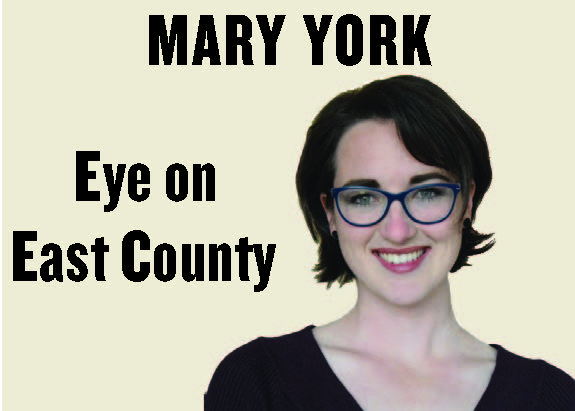Politics do not take a break, especially not over the holidays when family comes to town.
Reconnecting with old college friends and relatives I do not often see gave me the occasion to hear a disheartening story and the discussion that followed it about an immigrant grandfather who was unable to join his family in merry-making over the holiday because he never learned English.
Politics do not take a break, especially not over the holidays when family comes to town.
Reconnecting with old college friends and relatives I do not often see gave me the occasion to hear a disheartening story and the discussion that followed it about an immigrant grandfather who was unable to join his family in merry-making over the holiday because he never learned English.
I forget now whether this story was a true account told second-hand or if it was simply a theoretical situation. In either case, the discussion that was borne from the telling was interesting.
Should the grandfather have made more of an effort to learn English once he moved to the States? Or should the grandchildren have been made to learn Spanish?
(For the sake of argument, we allowed Spanish to be supplimented with any other foreign tongue spoken on American soil.)
Now, the general attitude toward the grandfather – sad though his situation was, watching his children and grandchildren, this beautiful family he had created, provided for and loved, celebrate the holiday in a language he did not feel comfortable in and leaving him to watch television by himself – was that he really ought to have tried to learn English.
I love languages and I believe they are bridges that connect us to people. I believe they are adventures that help us see the world in new ways. I believe they are tools as much as they are gifts. But I also know they are a labor of love and extremely difficult to master.
Because of the lack of details surrounding this grandfather’s story, we do not know how old he was when he immigrated to the States or where he was employed, whether or not he enrolled in school or took formal classes to learn English. All we know is that, in his greying years he does not feel comfortable enough using it to join in the babbling celebrations of his very large family.
There could be many reasons for this. He might have worked in construction, food service or any number of other honest trades where most of his coworkers would also have spoken primarily in his native language. In that case, he would have had precious little opportunity to learn and practice English.
But his kids were learning it at home. Why did he not speak English with them?
This is really quite simple, and the explanation is one I find both sweet and fascinating.
Language is relational. It is tied to our experiences, emotions and relationships. If Spanish is his first language, it is likely that is also his “heart language,” or the way in which he best expresses his deepest, most sincere feelings. It is the language he would most comfortably choose when speaking to his family and friends. Why would he speak English at home and emotionally distance himself in that way?
Of course, many immigrants have done just that – my great grandparents from Italy did, which is why I speak exactly seven words of Italian, four of which I learned from Andrea Bocelli and the other three I learned because I went to Italy myself and had to figure out how to order coffee.
The point I am trying to draw here, however, is that expecting new Americans to abandon their native language in their own home is not entirely reasonable.
But if this man has been living in the United States for years, how come he has not picked up the language?
Sometimes I wonder if people who ask this have ever spent any great amount of time in a place where they do not know the common tongue. I spent two years in the Czech Republic, and despite taking classes two days a week for nearly the entire time I lived there, learning to comfortably communicate was easily the hardest part of living abroad.
Especially for adults, acquiring second language skills means overcoming an already shaped blue print for how we receive, process and respond. We literally have to retrain our brains how to think. It is exhausting. Some days I would come home after working at the school, making small talk with coworkers and helping students, and my mind would feel like mush. I would be physically tired from the mental exertion.
It can be a very draining experience, so I completely understand why immigrants who come to this country, who spend all day working hard to make ends meet, have little energy left over to try functioning in a second language.
Those who do successfully pick up English – and it is quite a large number when we consider just how challenging it can be – have achieved something quite remarkable that most Americans born in this country cannot similarly claim.
So then we come to the second question in our conversation: should the grandchildren have been made to learn Spanish?
I refer back to my original belief that languages are wonderful, but difficut to learn and maintain. If a language is not practiced often, we lose it. And certainly, we cannot properly become proficient in it without constant work.
For the same reason that it would be naive to expect all immigrants to be able to learn English proficiently, it is also naive to expect their grandchildren to learn the language of their grandparents.
Even first generation Americans display different proficiency levels, depending on how often their parent’s language is spoken in the home or in their community. Some can understand but not speak, some speak but not very well. Others speak very well, but their children may not if one parent marries outside the language community.
The whole subject of language in the United States is controversial. For the record, it always has been. There have always been people who claim that everyone should speak English when they come to this country.
English itself, American English being a stunning example in particular, is actually a conglomeration of multiple languages – Danish, Norse and French – and is influenced by Latin, Greek, even Japanese and Hindi. We have borrowed words from German, Italian, Nahuatl, Czech, Algonquian and so, so many more.
If our language can be so inclusive, and be more vibrant and colorful for it, why can’t we?
But perhaps the most notable part of this conversation for me was that I have been learning American Sign Language. Not formally, but I have used YouTube to learn a few ways to communicate in ASL. We occasionally receive deaf or hard of hearing customers, and I want to be able to say “thank you” or “you’re welcome” in a way that is meaningful to them.
This was well received by some of the same people who are critical of immigrants who are unable to learn English.
Why is that? Both ASL and Spanish are different languages. But one language community we welcome and accomodate and the other we eschew.
Perhaps the problem is not with the language or the circumstances, but with us. Perhaps we are choosing when to be empathetic and when not to be. Perhaps this is something we as a community can work on as we head into 2019.
Most of us agree that 2018 was vicious, polarizing and unpleasant in a lot of ways.
The change, as always, begins with us, and with a first step.
Perhaps our first step this year can be to increase our empathy and respect for people who live and love and express their lives in a language not our own.
Perhaps we can find ways to build bridges between ourselves and so enable us to take the next step towards meaningful change together.














